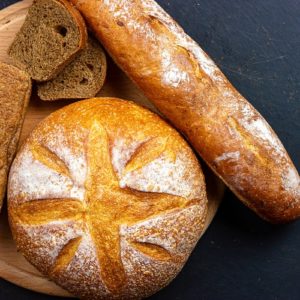Pas Yisroel
By: Rabbi Dovid Cohen
cRc Administrative Rabbinical Coordinator

Background
In the times of the Mishnah, and possible even earlier, Chazal forbade us from eating bread-like items that were baked exclusively by non-Jews. [The bread-like items are referred to as pas and that term will be defined more clearly below]. If however, a Jew baked the pas, or even participated in some small way in the baking process, the food items are permitted and are known as pas Yisroel. In later years, Chazal partially retracted this prohibition because the baking ovens were controlled and/or owned by non-Jews, and the aforementioned restriction made it overly difficult for Jews to obtain “kosher” pas.
In partially retracting the prohibition, Chazal created a new class of pas called “pas paltar”, whose literal translation is “baker’s pas”. Whereas pas baked by a non-Jew in his home remained forbidden, pas sold in a bakery or other commercial setting where the non-Jewish baker and the Jewish customer don’t have personal contact was now permitted even if no Jew had a hand in the baking. However, there are two opinions in the Rishonim as to how this retraction was structured.
Some say that since the prohibition was only retracted due to the difficulty in obtaining pas Yisroel, pas paltar is only permitted when pas Yisroel isn’t readily available. However, in situations where pas Yisroel can be purchased, the original rules apply and pas paltar remains forbidden.
Others hold that the retraction applies to all cases, and pas paltar is permitted even when pas Yisroel is readily available.
The accepted practice is to follow the latter, more lenient, opinion but there are those who have the commendable practice of following the stricter approach (and some do so on Shabbos – see Mishnah Berurah 242:6). To help these consumers, (a) all bread products served at cRc certified restaurants are pas Yisroel, and (b) we strive to guarantee that all cRc certified bread products are pas Yisroel. Consumers who choose to be careful about this halacha should be cautioned to not assume that all foods sold by Jewish companies with “heimishe” sounding names are pas Yisroel, and should rather check the packaging and/or speak to the Rav HaMachshir.
However, the time of year when most people are machmir regarding pas Yisroel is during the days between Rosh Hashanah and Yom Kippur (Aseres Y’mei Teshuvah), based on Shulchan Aruch OC 603:1 who records such a custom. During those 10 days, Jews who otherwise rely on the lenient opinion that permits pas paltar in all cases, are careful to only eat pas Yisroel when it reasonably available. It is worth noting that in this context, Mishnah Berurah (603:1) defines “reasonably available” as requiring less than 72 minutes of travel to obtain.
Which Foods are Pas
As noted, the term “pas” refers to bread-like foods, and to qualify as pas the food must meet the following criteria:
- It must contain one or more of the 5 primary grains: wheat, barley, rye, oats or spelt. Thus, rice cakes, corn flakes, and most corn tortillas do not require pas Yisroel as they aren’t made from these grains. Although granola bars are made from oats, most hold that they do not qualify as pas (and the bracha rishona is ha’adamah) due to technicalities regarding how they are produced which are beyond the scope of this summary. On the other hand, breads made from “sprouted wheat” are most definitely pas.
- It must have tzuras hapas / the “form” of bread. There is much discussion as to how to define this term, but it is clear that all bread, bagels, cake, crackers, cookies, pies, pizza, soft pretzels and most hard pretzels have tzuras hapas, and that pasta does not. There are differences of opinion as to whether very small hard-pretzels, blintzes, mandel-type soup croutons, very thin wafers, and wraps have tzuras hapas. It is generally accepted that Cheerios-like cereals do not have tzuras hapas, and Rav Schwartz has confirmed that he accepts this opinion. [They may also not be pas based on criteria #3].
- Shulchan Aruch (OC 168:13) cites two opinions as to whether pas is limited to items which are baked (or fried in a minimal amount of oil) or even includes doughnuts and similar items that are made with a bread-like batter but are cooked or deep-fried.